How to shop for a sustainable wedding outfit, from recycled dresses to handmade accessories
You can even donate your bouquet for a wasteless day
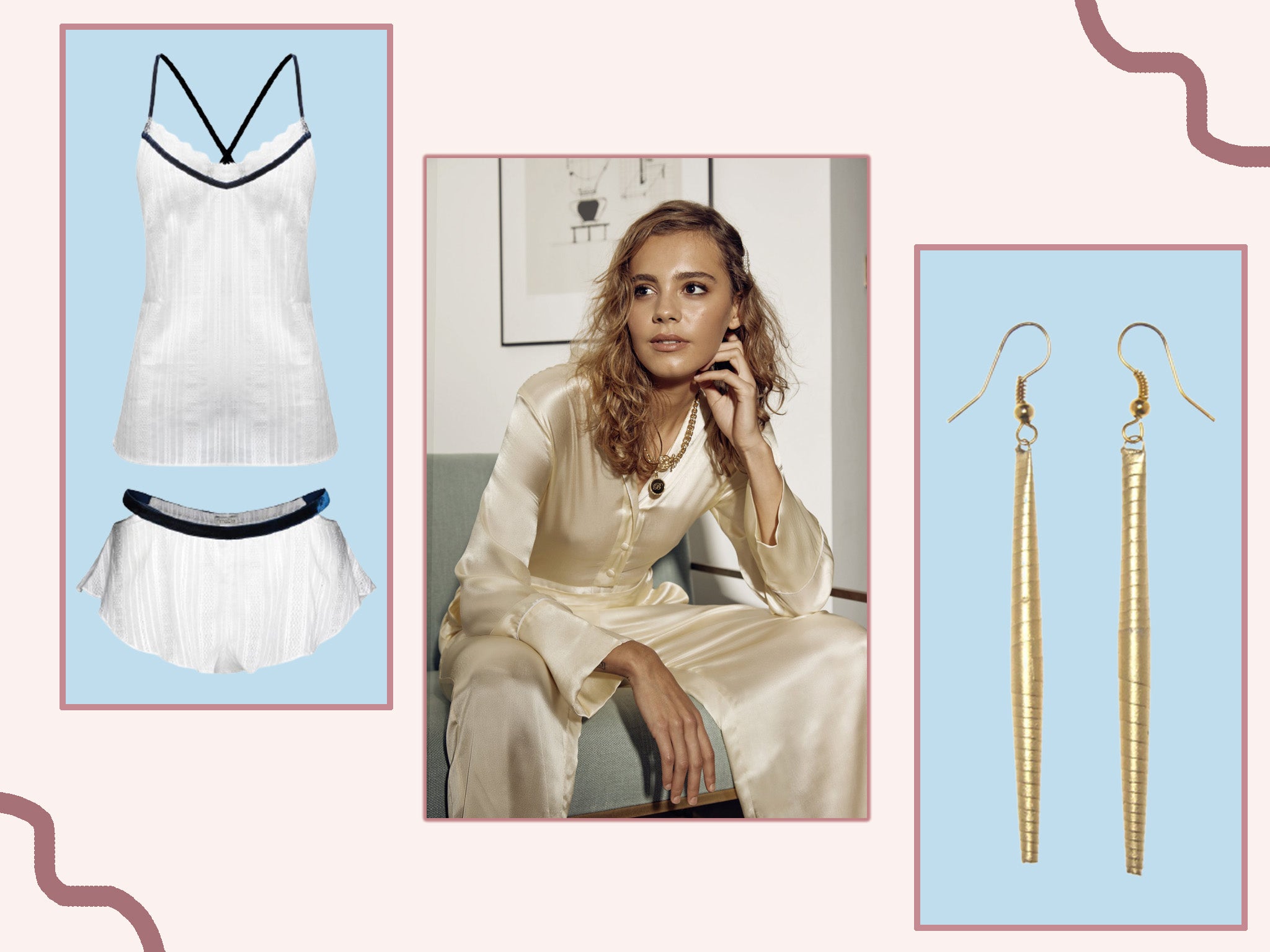
Your support helps us to tell the story
From reproductive rights to climate change to Big Tech, The Independent is on the ground when the story is developing. Whether it's investigating the financials of Elon Musk's pro-Trump PAC or producing our latest documentary, 'The A Word', which shines a light on the American women fighting for reproductive rights, we know how important it is to parse out the facts from the messaging.
At such a critical moment in US history, we need reporters on the ground. Your donation allows us to keep sending journalists to speak to both sides of the story.
The Independent is trusted by Americans across the entire political spectrum. And unlike many other quality news outlets, we choose not to lock Americans out of our reporting and analysis with paywalls. We believe quality journalism should be available to everyone, paid for by those who can afford it.
Your support makes all the difference.In recent years, sustainability has become a big focus for almost every industry, particularly fashion, as many of us are trying to make more conscious decisions as shoppers. While it's a global issue, one way individuals can make a positive change is through what we wear ourselves, and what we demand from brands.
According to the UN Fashion Alliance, the clothing and textile industry is responsible for 8-10 per cent of the world’s greenhouse gas emissions and 20 per cent of wastewater pollution. Clothing underutilisation and lack of recycling leads to $500bn of lost value every year.
Fashion labels have been responding to the need for change, and it has become far easier to shop sustainably for basics like jeans and dresses, but it's also possible to apply an eco-friendly approach to your wedding outfit too.
It’s not a particularly new idea either – for decades many brides have chosen to wear repurposed gowns previously worn by their mothers, grandmothers and great-grandmothers. In July 2020, Princess Beatrice made headlines for wearing a vintage gown borrowed from the Queen for her nuptials to Edoardo Mapelli Mozzi. Designed by British couturier Norman Hartnell, the ivory gown had a square neckline with organza puff sleeves and a diamanté and checkered bodice. The Queen first wore the dress to the 1962 premiere of Lawrence of Arabia at the Odeon in Leicester Square, London.
Although it was refreshing to see a royal repurpose a wedding dress, we don’t all have a catalogue of beautiful gowns from our grandmothers to re-wear. But that doesn’t mean you can’t shop sustainably for you outfit and accessories. We’ve curated a guide to ethical bridal shopping that covers everything from veils and shoes to handbags and jewellery.
Read more:
You can trust our independent round-ups. We may earn commission from some of the retailers, but we never allow this to influence selections. This revenue helps us to fund journalism across The Independent.
Where to start
When trying to make more sustainable choices for your wedding, you don’t need to compromise on luxury. Kate Halfpenny, founder of bridalwear brand Halfpenny London, has made small changes in the day-to-day running of her business to reduce waste and control its stock to limit any materials ending up in a landfill.
“As a company, we try to create as little waste as possible and repurpose offcuts of fabric to make new styles and embellishments, making sure all of our packaging is eco-friendly, even down the inks we use,” she says.
“Right now, we are creating a limited collection of bridalwear using discontinued stock fabrics that we have accumulated over the past 15 years. I love the idea of creating something unique and beautiful from what could be considered waste.”
Concepts like these are making it easier than you think to look your best on your big day while helping the environment.
All it takes is a few simple switches to create the perfect outfit, and we've done all the hard work for you by finding the labels that are championing sustainability.
Underwear
The foundation for any well-fitting outfit is underwear, whether you’re wearing a ballgown or suit down the aisle.
Lara Intimates is a London-based brand that impressed us in our guide to the best sustainable lingerie brands. It creates pieces in its all-women Hackney studio using materials from factories that have overstocked or overproduced fabric. Instead of going to landfill, the brand remakes them into beautiful and comfortable designs, available in 26A-36GG.
Its Ava bra (£48, Laraintimates.com) and matching briefs (£20, Laraintimates.com) in a subtle pink make a beautiful set that you can wear long after the ceremony too.
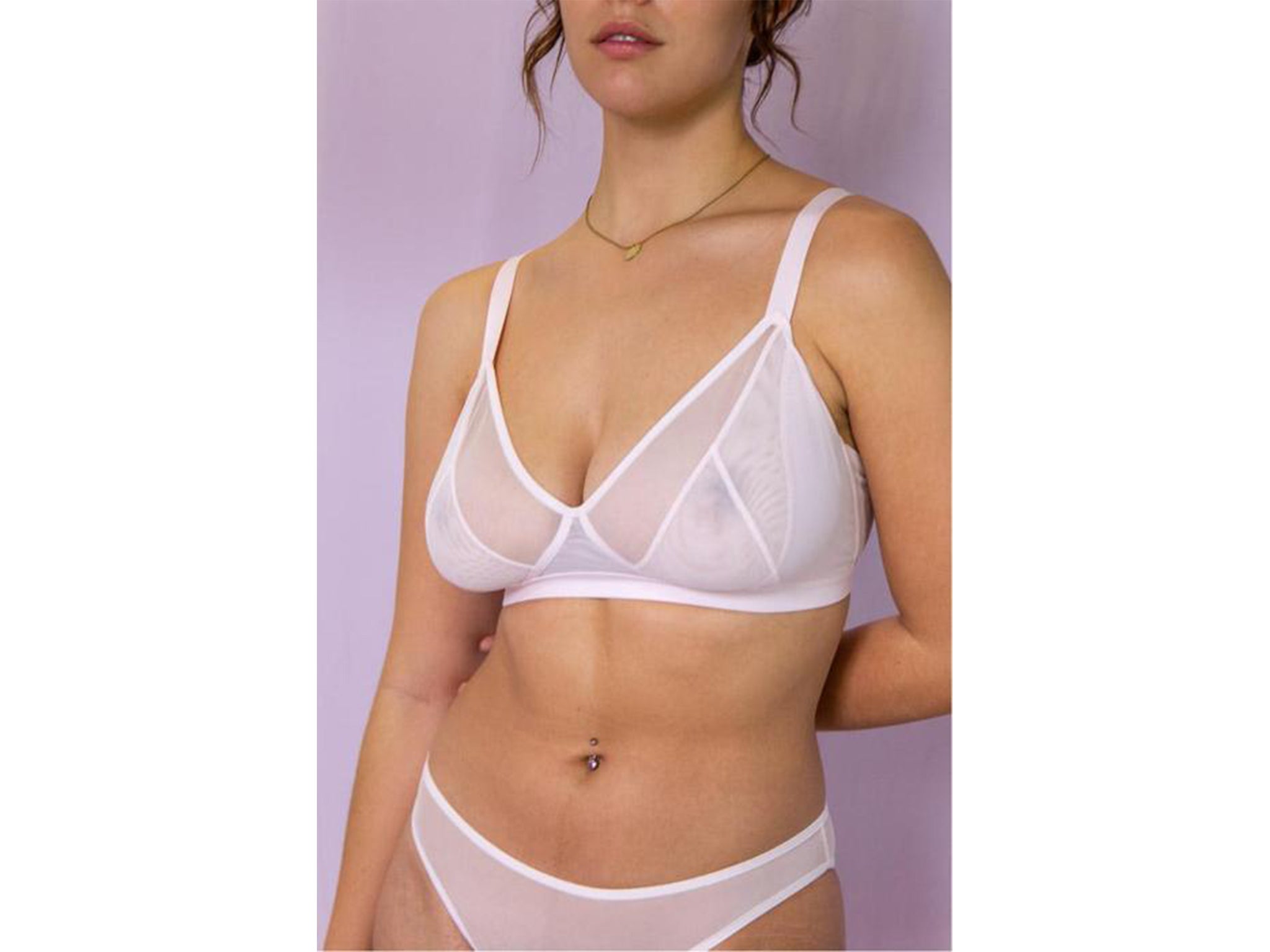
It comprises a low cut, triangle bra and high-waisted briefs for full coverage and total support, but will still cut a stylish figure underneath your clothes.
In our guide, we also loved this AmaElla ivory organic cotton nightwear set (£109, Amaella.com) which would be perfect for your wedding night or honeymoon.
Made entirely from organic, Fairtrade cotton with a velvet navy trim detailing, our reviewer found it soft, breathable and beautifully packaged.
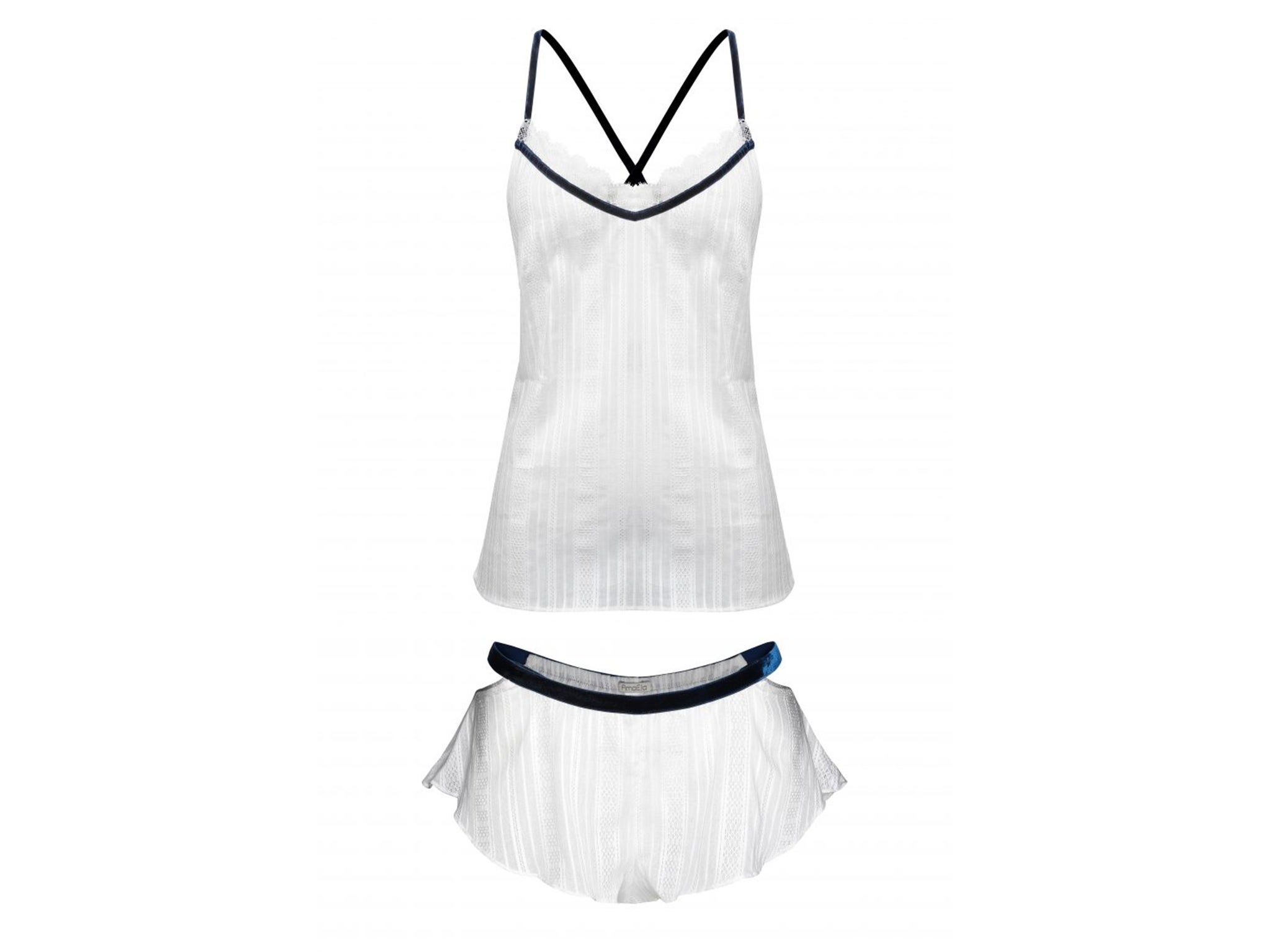
“Like all the lingerie from AmaElla, this set is made in Portugal by a family-owned factory driven by ethics – every employee has a fixed contract (so there is no subcontracting or temporary workers) and the workers' union keeps an ongoing dialogue with the owners to safeguards workers’ rights,” explained our writer.
The brand also doesn’t airbrush any of its photos. Clothes are made with generous sizing, so if you’re in-between sizes, opt for the smaller one for the best fit.
The dress
If you’re opting for a traditional wedding dress, before you buy a brand-new one, take a look at Brides Do Good, a sustainable wedding dress boutique based in Fulham, London.
It has a handpicked selection of dresses that have been donated by brides and brands to encourage customers to wear second-hand pieces.
As a result, they’re much cheaper – up to 65 per cent off the full price – and for every £3 the business makes, it invests £1 into charity projects that work to end child marriage, including Plan International UK, the Safeguard Futures Ban Child Marriage Campaign and Huru International.
If you’ve already had your big day but still want to get involved, you can also donate your dress using this form to share details of the design, size and style for the brand to then sell on.
There’s a £30 booking fee if you want to make an appointment, but 100 per cent of it goes towards the charities it works with.
For other sustainable dress options, look to Halfpenny London, which has a collection called Daydreamer which uses recycled materials, British-made lace and fabrics that have a low carbon footprint.
“We’re also giving back to the communities we use for our materials and beading and donating a portion of our appointment fees to charity and we will continue to push forward to open our own sustainable British factory over the next two years,” the founder says.
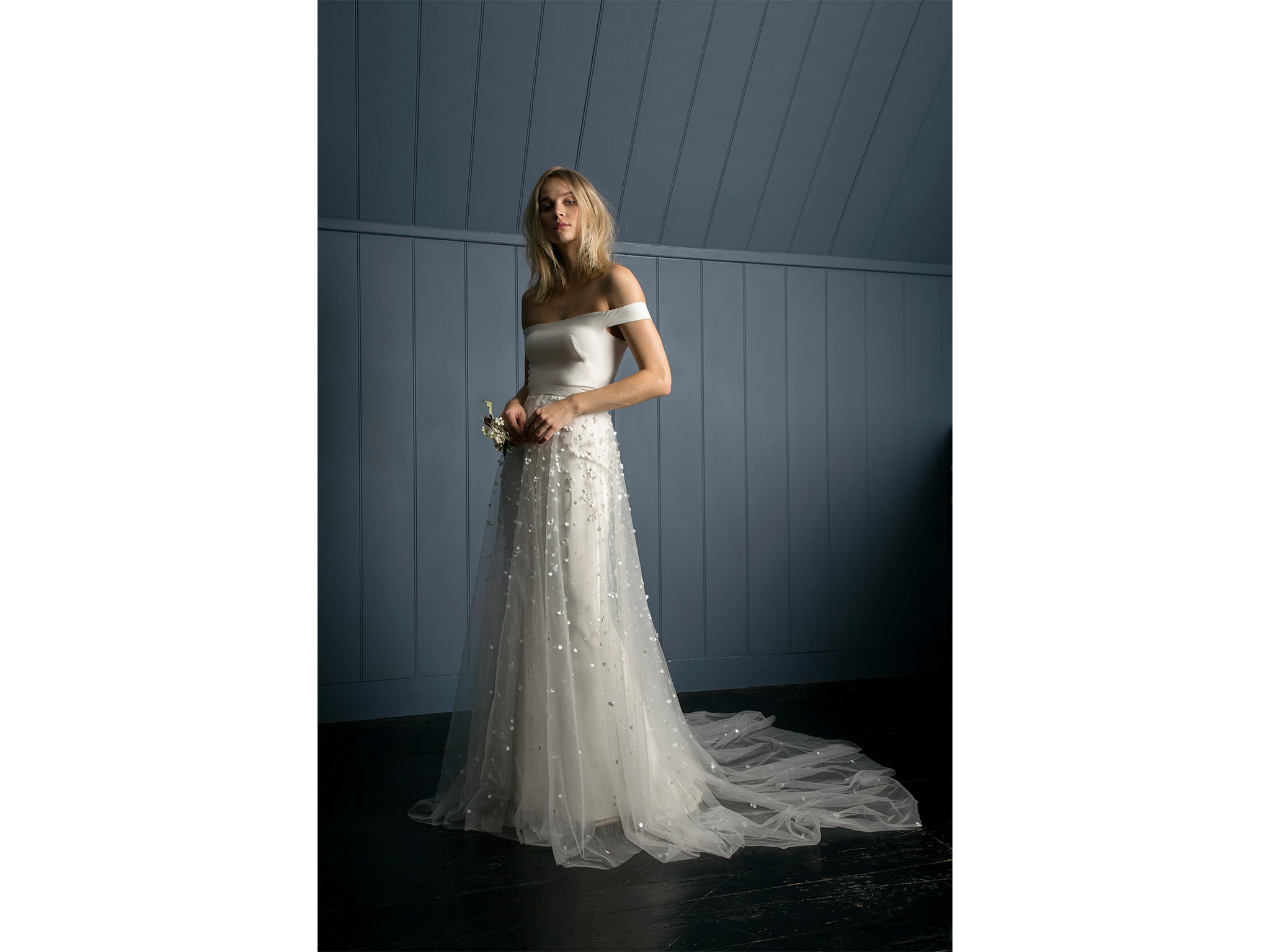
Known for its interchangeable separates that can be mixed and matched depending on your style, it’s proof that you can still have a luxury bridal experience without compromising on sustainability.
Our favourite piece from the line is this sycamore skirt (£2,250, Halfpennylondon.com) and harbour dress (£2,300, Halfpennylondon.com) that has an off-the-shoulder, bardot-style top and a slinky silhouette, layered beneath a detachable sequin skirt.
Elegant and modern, the skirt can be worn for the ceremony then removed for the reception, or vice versa, giving an ethereal feel to a column-shaped piece that still keeps the classic wedding dress shape.
Suits and jumpsuits
If you’re shying away from a typical floor-sweeping gown for your upcoming nuptials and instead are drawn to sharp suiting and contemporary styles, then look to these sustainable brands for some inspiration.
We’d recommend this Clemmie Rose the ammu jumpsuit (£225, Gatherandsee.com) that’s 100 per cent silk, with pyjama-style cuffs, a button-down front and a tie belt for a luxurious but very comfortable bridal look on your big day.
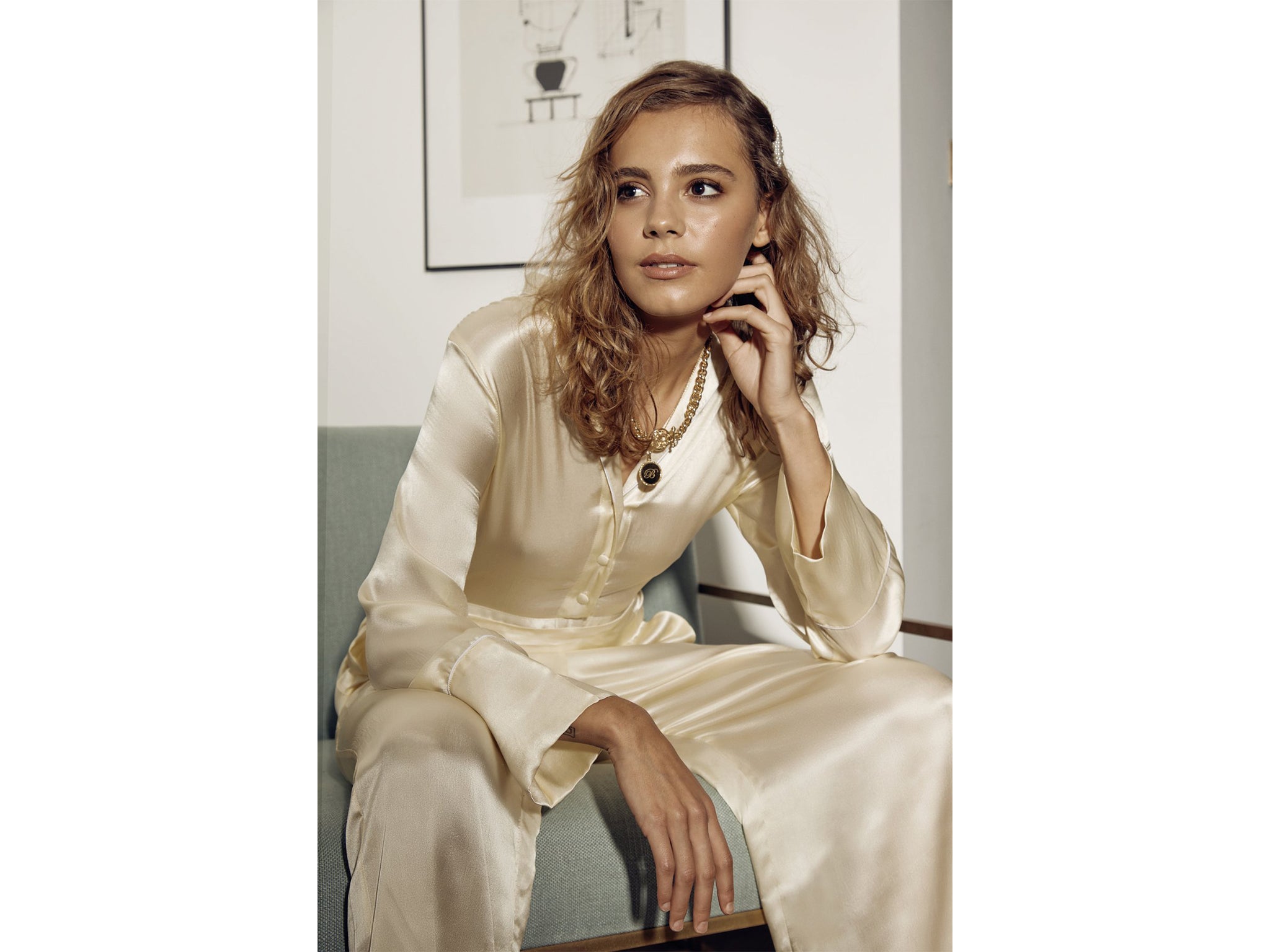
The brand specialises in creating luxury silk pieces, using dyes that are all vegan and organic and made by women in south India in a small factory. Production can be kept to a small scale to minimise waste, and the factory offers employment opportunities to vulnerable women.
This silk, sage-green paige two piece suit (£319, Loragene.com) is a showstopping option if you’re ditching tradition but still want something memorable.
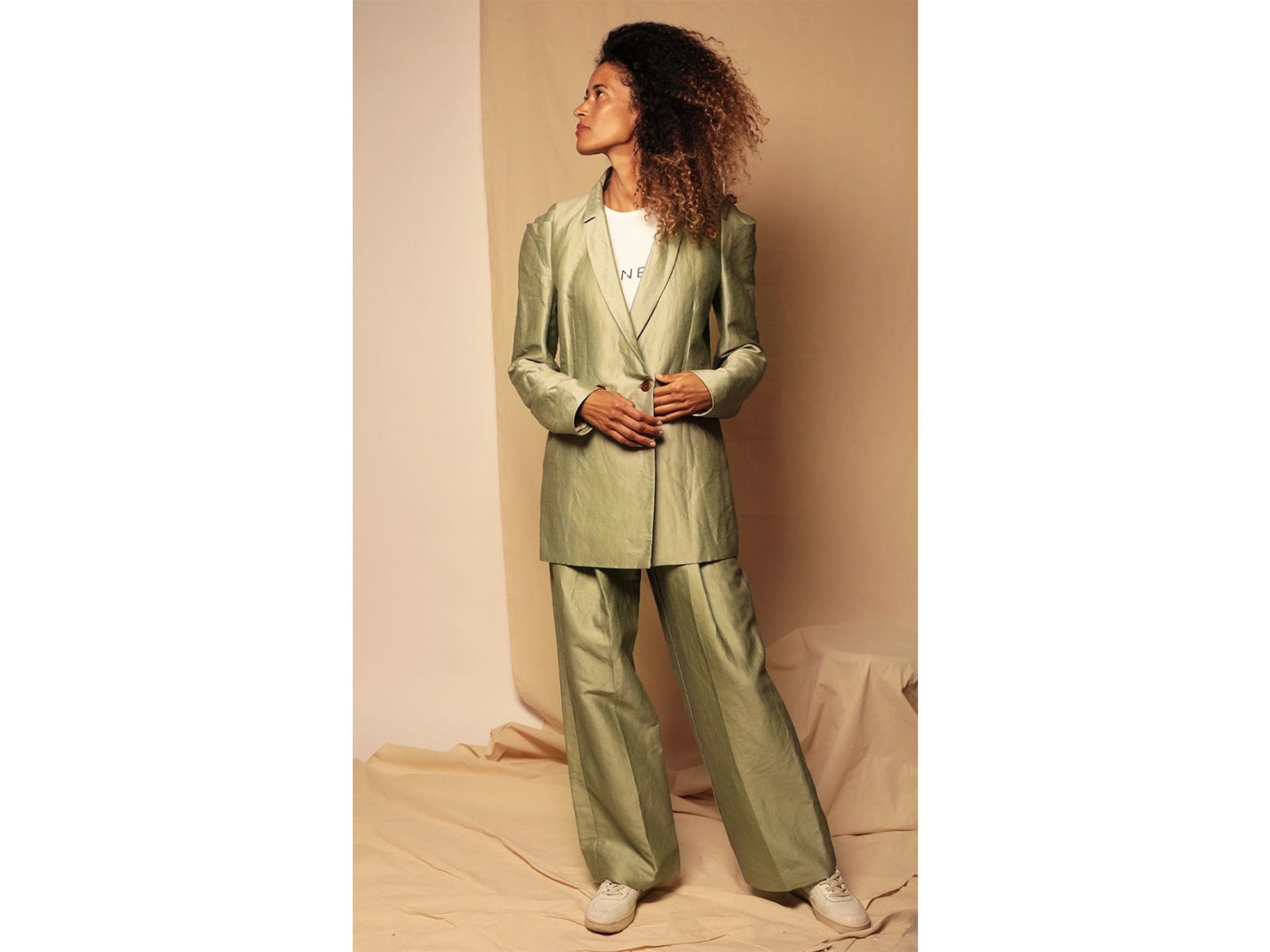
It’s loose fitting but perfect for the modern bride looking for a piece that's truly unique. All the yarns and woven fabrics used by the brand are organic or sourced from surplus stock, and its pieces are manufactured in its factory in Sofia, Bulgaria, by tailors who are paid a living wage.
Flowers
While weddings aren't the same without flowers, huge bouquets and decorations can often go to waste once you and your guests have left the venue.
But thanks to charities like Floral Angels, this doesn't have to be the case.
Run entirely on a volunteer basis, the organisation recycles and reuses flowers from weddings and other events, delivering bouquets and arrangements to local care homes, shelters and hospices.
The team is based out of New Covent Garden Flower Market and also works with a range of charities, including Hestia, Age Unlimited and Pavement2Catwalk.
Veils
Indiebride London is another brand that uses offcuts to reduce waste when making its dresses, skirts and accessory pieces for brides.
Each design is made to order and any leftover fabric is used to make veils, sashes and headpieces.
Any materials that can’t be repurposed are donated to fashion students, who often have a limited budget.
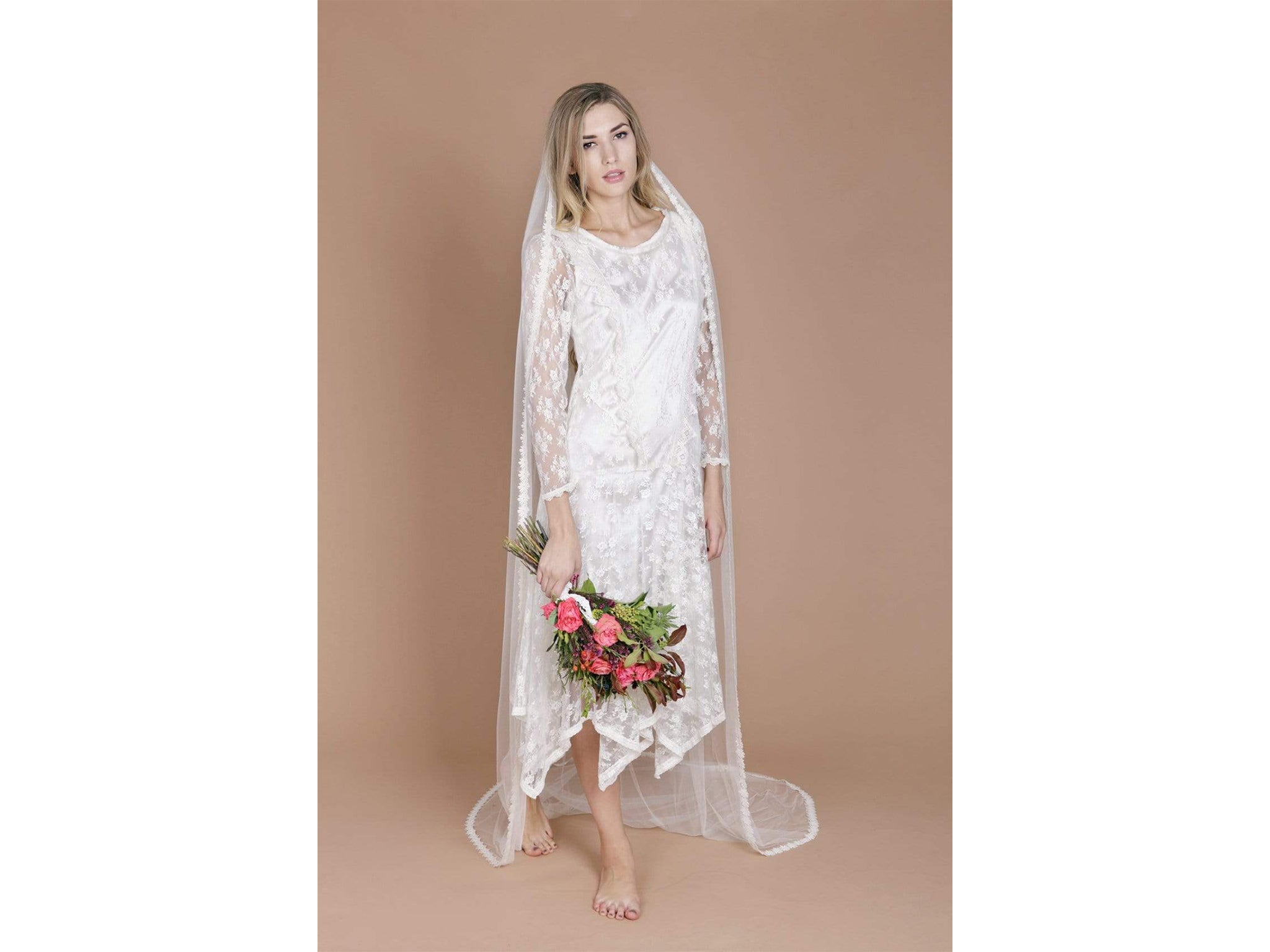
We love this Cassie veil (£190, Indiebridelondon.co.uk). Made with a single layer of silk tulle, it attaches via a hair comb and has dainty lace flowers on the trimming.
It’s the perfect complement to a dress, suit or jumpsuit and the brand also has a range of headdresses, garters and belts for adding that finishing touch.
Jewellery
If you want to wear a pair of statement earrings with a minimal outfit, or are never without your gold layered necklaces, adding new pieces to your collection, while still helping the planet, is simple.
In our guide to the best ethical jewellery brands, we loved Quazi Design. It uses discarded magazines to create a style of bead that's then transformed into colourful earrings, necklaces and rings.
Its products are affordable too, with most prices ranging between £10-£20. These bead earrings (£10, Quazidesign.com) are our favourite pick as we love the elegant, drop design that will complement any hairstyle.
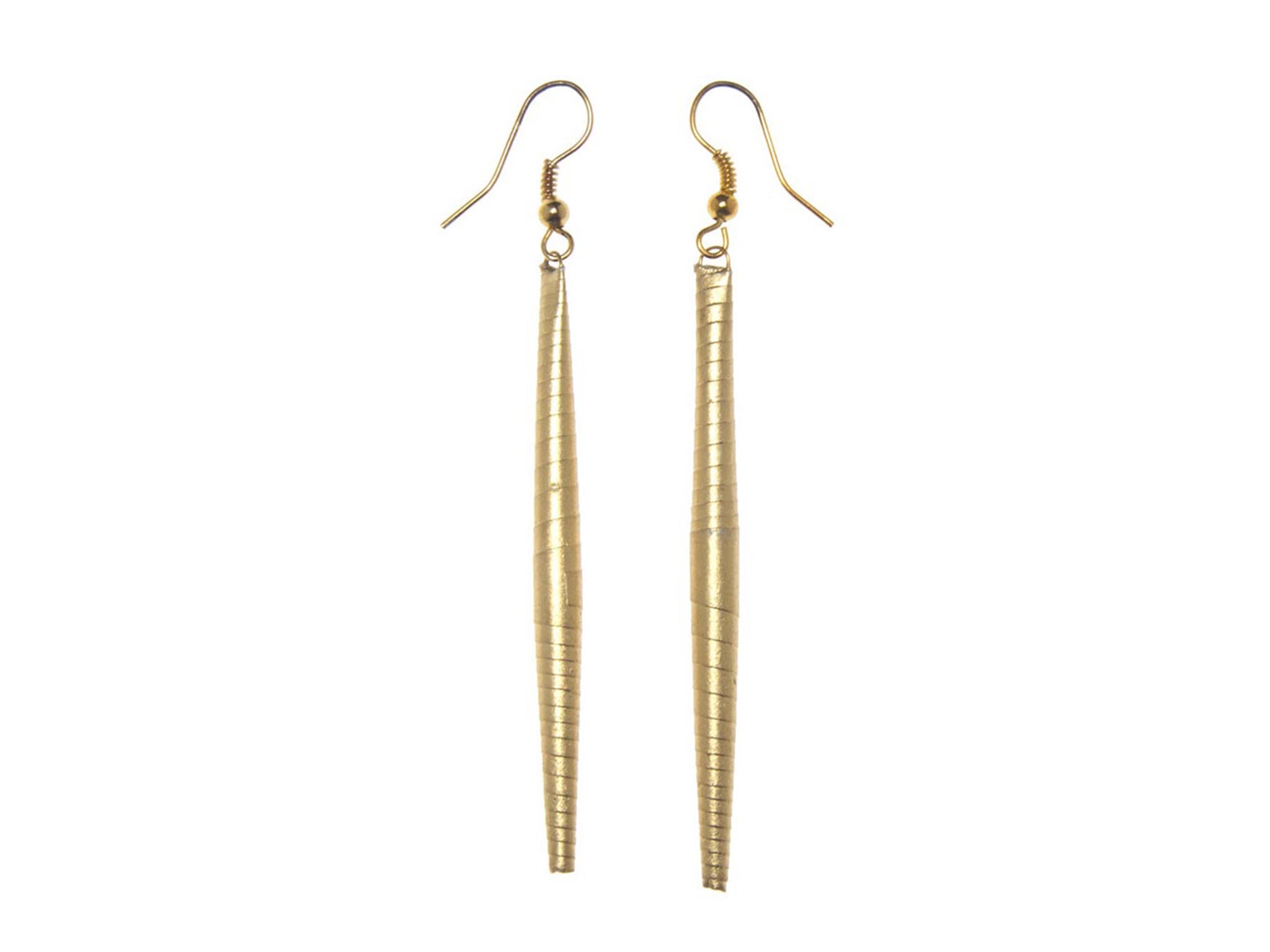
Doron Shaltiel founded the company in 2009 in Swaziland, where the products are still manufactured today under ethical working conditions.
We also love demi-fine jewellery brand Stellar79, created by sisters Natasha and Sheena who take inspiration from their Trinidadian and Mauritian heritage for every piece.
The brand offers beautifully delicate layering accessories, specialising in nine- and 18-karat-gold vermeil jewellery with gemstones. One of our favourite pieces is the soleil white topaz disc bracelet (£175, Stellar-79.com) which would do well with a white wedding dress and floral bouquet.

All of the brand’s materials are responsibly sourced and made ethically by artisans in Jaipur, India, and housed in recyclable jewellery boxes made from a mix of recycled and waste paper.
Daphine is another brand worth spending your money with. Based in the UK, it works with local artisans in its atelier in Jaipur to sustainably produce all its jewels. Known for its minimalist designs, you may recognise its oli ring (Daphine, £65, Shop-daphine.com) from the brand's first collection. It became a bestseller and was seen all over Instagram.
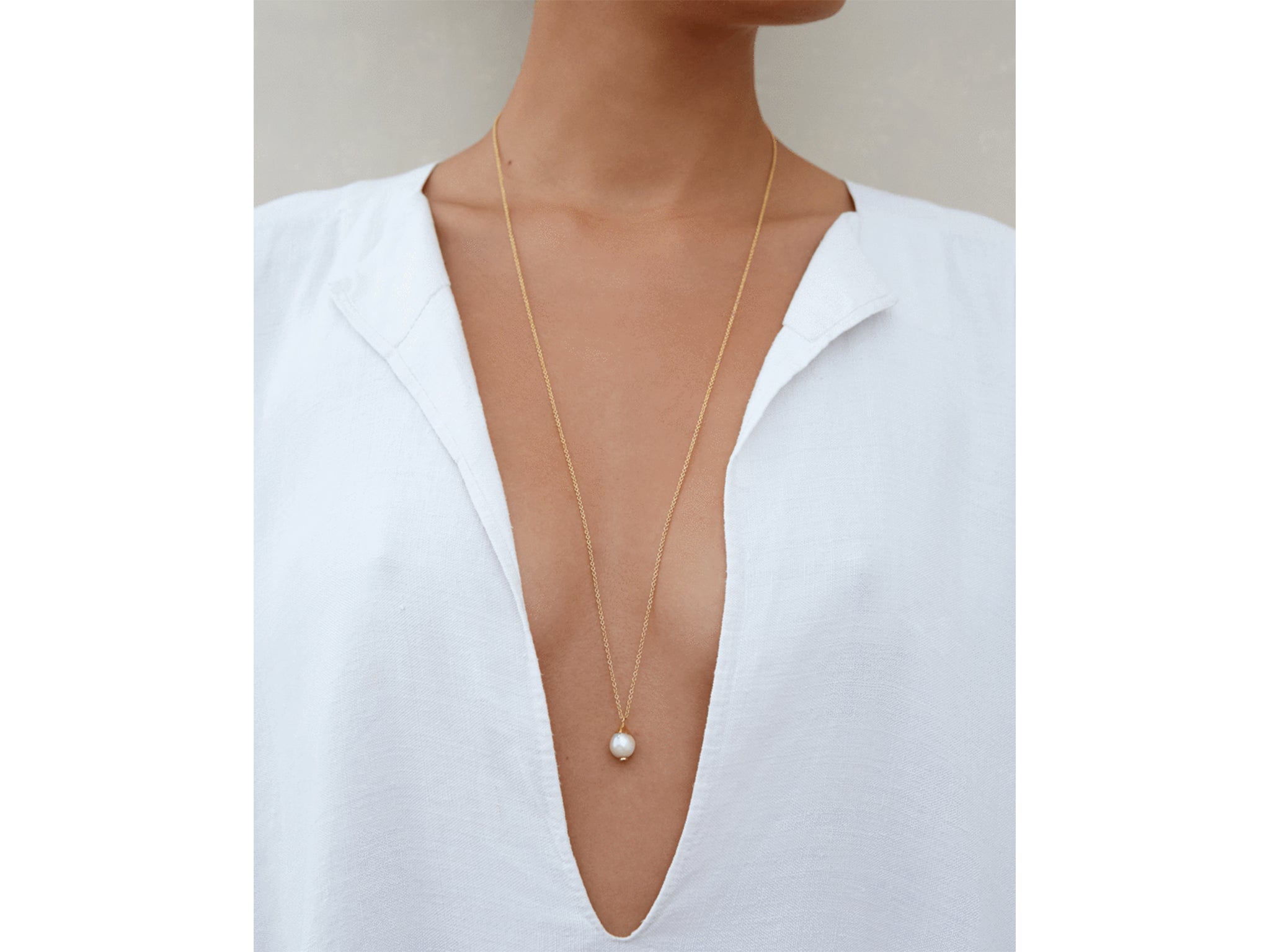
If you want to keep your hands exclusively for your engagement ring and new wedding band, this ora pearl necklace (£80, Shop-daphine.com) will suit an outfit with a low neckline, without drawing attention from your clothing.
A single pearl sits on a long, fine chain – it’s effortlessly chic, minimal and a piece you’ll be able to enjoy wearing for years to come.
Shoes
Walk down the aisle in environmentally conscious footwear with these Gigi strappy mid heel sandals (£248, Thereformation.com).
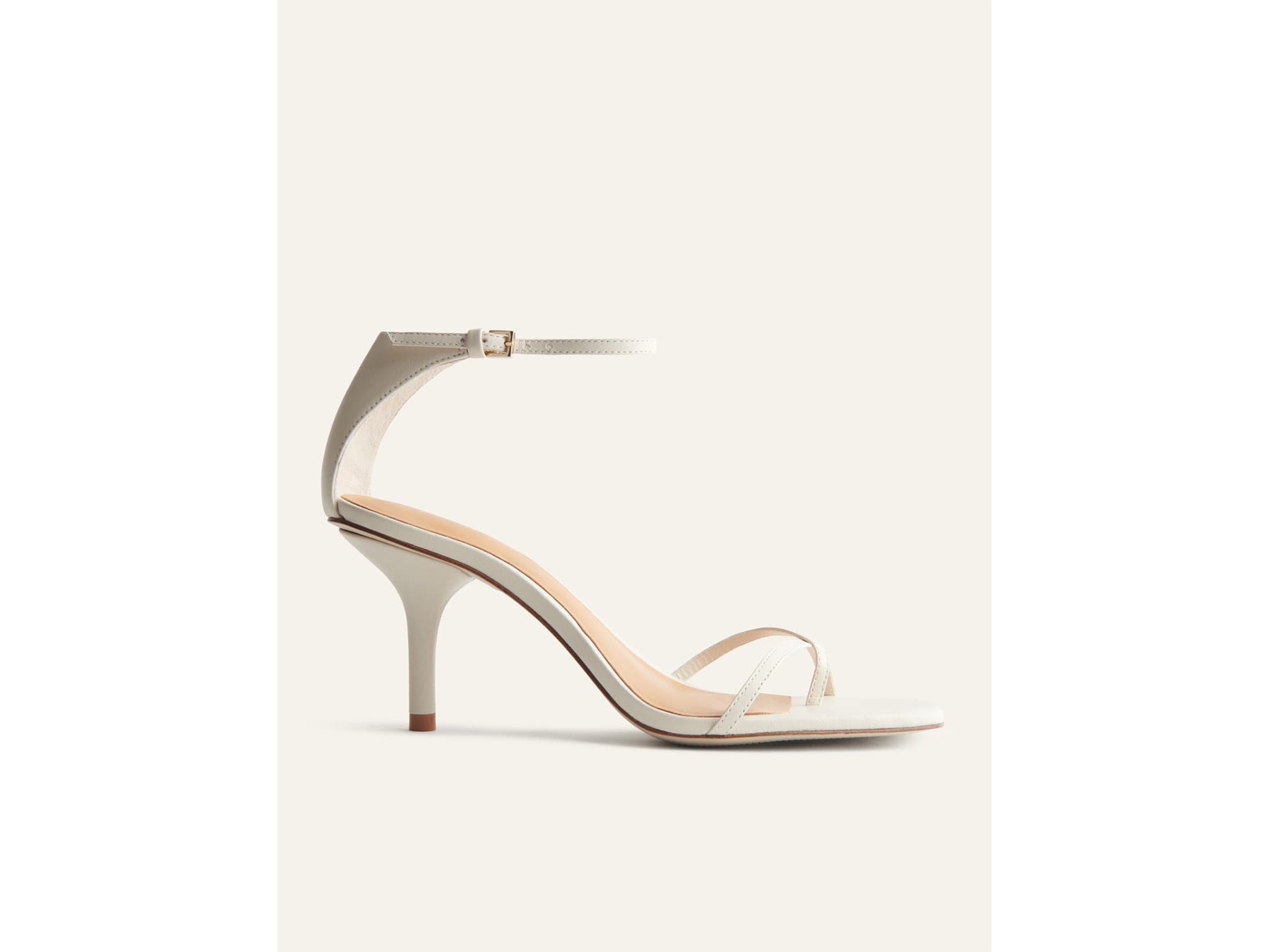
The padding inside the sole is made from renewable, plant-based foam, while the brand also uses leather made of 70 per cent leather waste for the outer sole and lining.
This pair will give you a bit of height without being too high to wear all day and are minimal but chic, so no matter how embellished or pared back your outfit, these are the perfect addition.
We also can't get enough of these venus white faux leather bow vegan mules (£220, Beyond-skin.com). The statement bow and on-trend mule style, with a comfortable low heel, mean they’ll look stunning peeking out beneath a dress or tailored trouser hem.
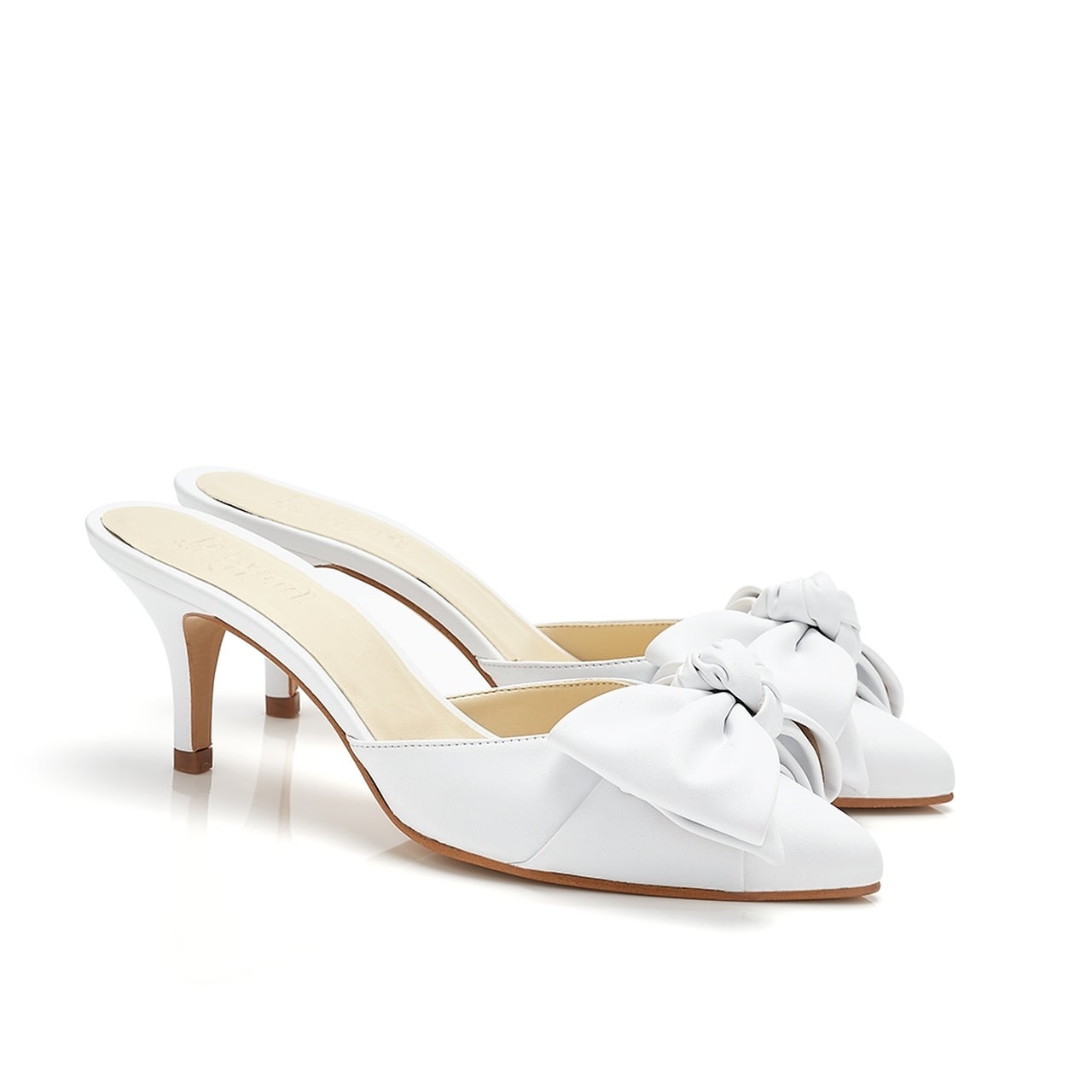
Completely vegan without losing that luxurious, soft-leather feel, the lining is made from 100 per cent recycled materials with a plant-based coating too.
The brand has an all-encompassing approach to sustainability, working closely with factories in Spain using locally sourced fabrics and components to reduce its carbon footprint. Not only that, all of its shoes have insoles made from approximately 70 per cent post-consumer cardboard too.
Bags
It's unlikely you'll be carrying your own handbag on your wedding day, as that's a job for your bridesmaids, but having one to hand with a top-up of lipstick and powder is always useful, especially just before taking photographs.
In our guide to the best vegan bags, we loved Mashu, a brand where all the items are designed in London and crafted by artisans in Greece.
The products use vegan materials that can even be recycled at the end of their lives, though look after them carefully and you'll be able to hand them down later on.
Our favourite style is this anais hemp and leopard bucket bag (£239, Mashu.co.uk), which has playful leopard print detailing, repurposed wooden handles and recycled polyester for the inner and outer lining.
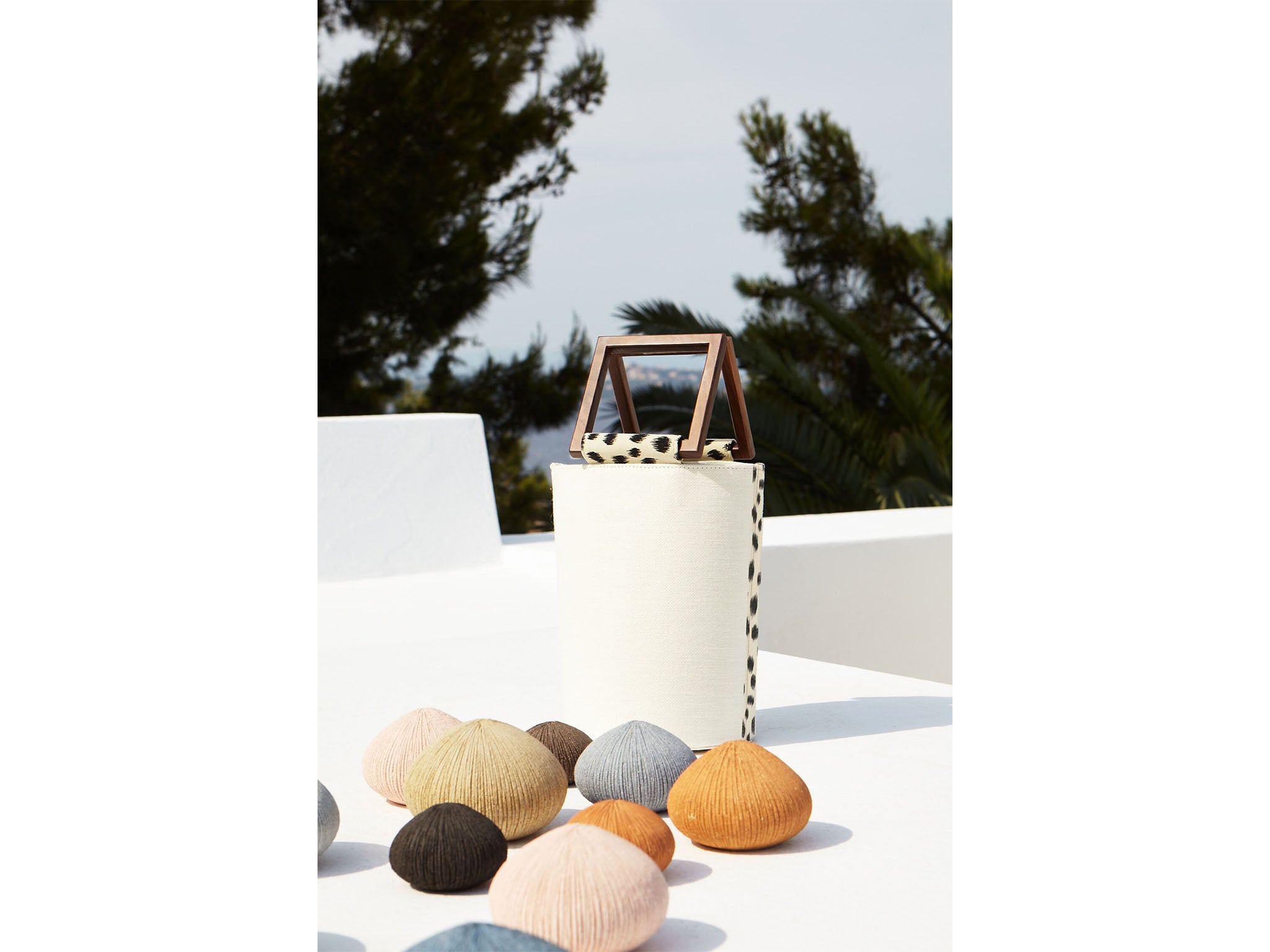
Keep an eye on Roop too, a small brand that only uses leftover or vintage fabrics to create furoshiki bags, inspired by the Japanese wrapping technique.
They regularly sell out, so make sure you snap up its popular white satin furoshiki bag (£75, Itsrooper.co.uk) while it’s still available.
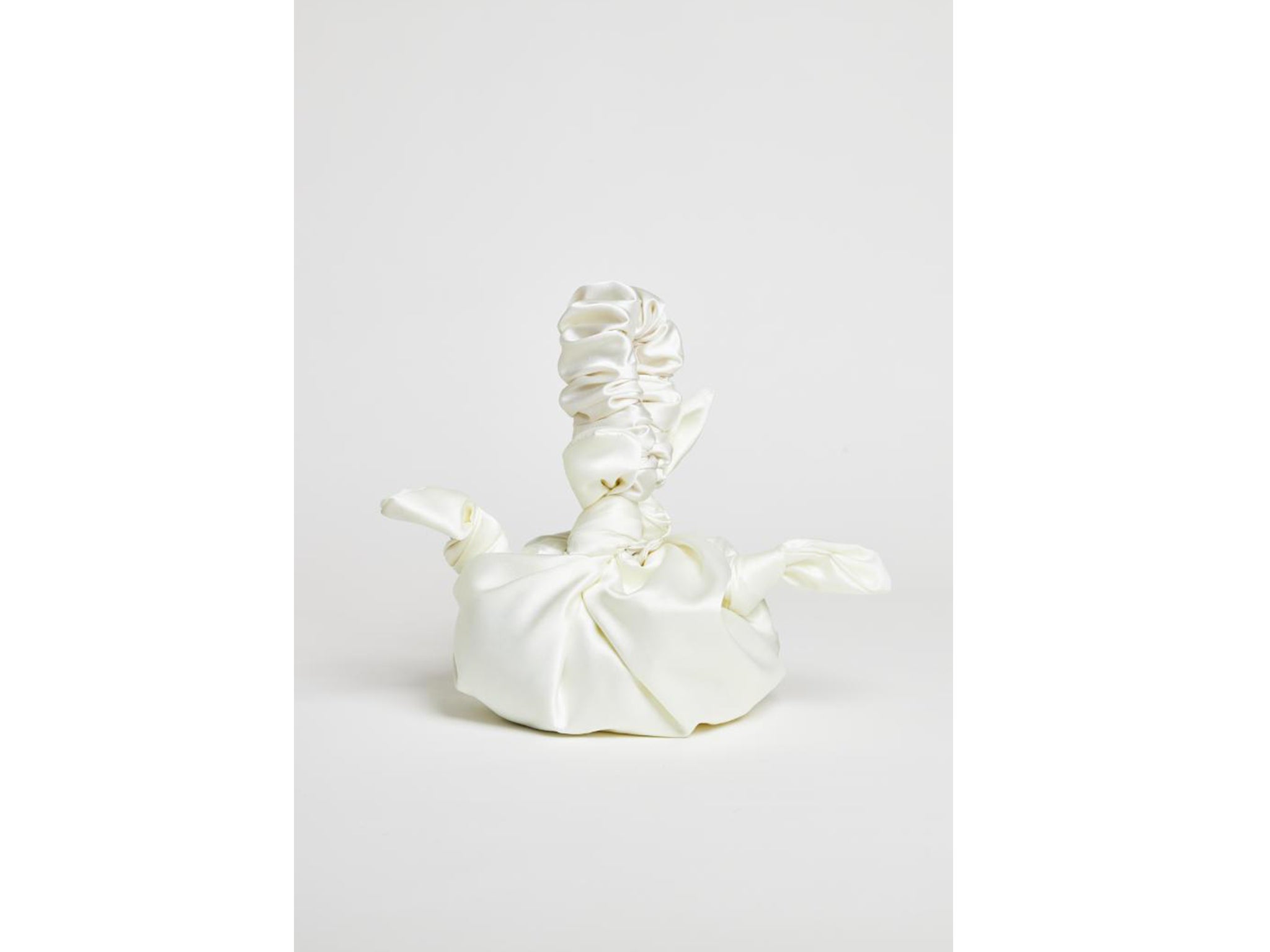
Each bag is handmade by founder Natasha, so you're getting a one-of-a-kind piece that you won't find elsewhere.
Voucher codes
For the latest discounts on wedding essentials and other bridal beauty offers, try the links below:
For more wedding-related fashion and beauty recommendations, read our guide to the 10 best bride essentials